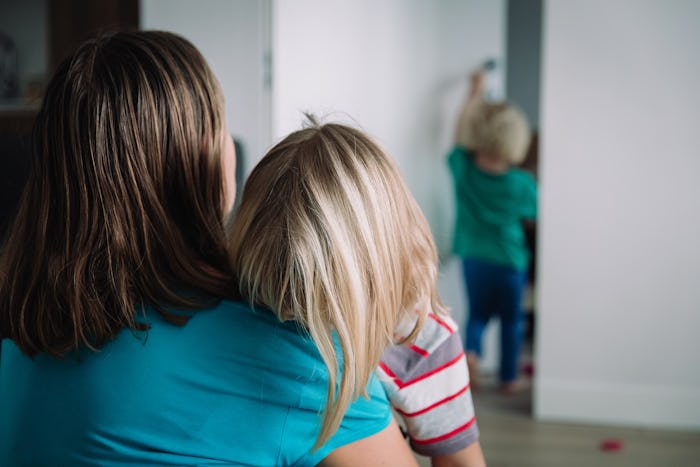Life

The way you were raised can have a tremendous impact on your mental health later on in life. For instance, if your mom did certain things while raising you, then you're at a greater risk for anxiety. Basically, your childhood history might offer some clues about your current adult anxiety.
First, though, it's important to note that there are many potential causes for anxiety. It isn't fair to blame moms (or dads or aunts or grandparents) for everything anxiety-related. Plus, mental health has lost a lot of its stigma in recent years, so it's something modern parents think about more openly. A few decades back, the potential for giving your kid anxiety was probably not considered. In each generation, most parents are simply doing their best to raise happy and healthy kids with whatever information they have available.
But your parent's attitudes and behaviors may have a lasting effect on your mental health later on. "Obviously, in general, anxious parents tend to raise anxious children," as psychotherapist Karen R. Koenig tells Romper. "This comes from what I call a double whammy: the genes that get passed down from parent to child which include an imbalance of neurotransmitters to combat anxiety and parenting styles which make children more, rather than less, anxious." Read on to see what else Koenig and other experts have to say about raising kids with anxiety.
1
Used A Controlling Parenting Style
Were your parents super demanding about grades, chores, or sports? Children raised with a controlling parenting style are at a greater risk for anxiety, as Karen R. Koenig, M.Ed., LCSW, tells Romper. In general, controlling parenting styles may include unrealistic expectations or unreasonable, strict rules, as explained in Psych Central. If you were expected to be a straight-A star athlete with a perfect attendance record, then maybe your parents were on the controlling side.
2
Worried About The Future
At its heart, anxiety is all about a fear of the future. So it makes sense that parents who worry a great deal about the future may pass that anxiety on to their kids, as Koenig says. Time will keep moving forward no matter how much you dread it.
3
Worried About What Others Think
This kind of social anxiety can also be taught. For the most part, parents who are extremely worried about what others think can also raise anxious children, says Koenig. Of course, you have no real control over anyone else's opinions, so it's a pointless and draining fear. (That said, concerning yourself with the opinions of strangers can be a super difficult habit to break.)
4
Failed To Self-Soothe
Learning how to manage anxiety is a crucial life skill, and maybe you didn't get a healthy model of that from your parents. "When they can't self-soothe, they're unable to teach their children to do so and help their children reduce anxiety," says Koenig. If your parents let stress and anxiety drive their lives, then you might struggle with soothing anxiety as well.
5
Discouraged Normal Socialization
Some rigid parenting styles discourage time spent with other kids as frivolous or even potentially dangerous. But this attitude can be damaging. "If a child isn't allowed to go to a friend's house, or go to a dance, he or she isn't learning regular and everyday decision making skills," says licensed marriage and family therapist Gabrielle Freire. But for the most part, it's perfectly safe and healthy for a kid to spend an afternoon at a friend's house.
6
Made All Decisions For You
At some point kids have to learn about responsible decision-making and consequences. "Think about this, handling all of your child's problems, and not letting them experience life's natural ups and downs, doesn't allow them to learn how to manage their feelings, which can lead to anxiety later in life," as Freire tells Romper. Learning how to deal with emotions in a healthy way is such a crucial life skill.
7
Used A Neglectful Parenting Style
Sometimes what parents don't do causes problems. With a neglectful parenting style, for instance, children don't get much emotional support, and they don't learn healthy ways to cope with feelings, as Ivanka Nikolova, Ph.D., head of Health Research at RunRepeat.com, tells Romper. "This leads to anxiety and a profound sense of unworthiness in childhood and in adulthood." Growing up without that crucial support leaves its mark.
8
Acted In An Unpredictable Way
Confusing parenting styles can also lead to anxiety for children. "If the parents are very unpredictable, the child grows up weary and anxious," says Nikolova. "If the same behavior is once praised, and the next time yelled for, it's natural for the child to become anxious and confused." The children don't grow up with a strong sense of what behaviors are OK.
9
Shared Adult Problems With You
Treating your child like a responsible, reasonable person is great, but they're still a kid at heart. "Where this parenting technique can go wrong is if the child becomes an emotional confidante for the parent," says Helena Plater-Zyberk, co-founder of Supportiv. "Are you sharing the real-life struggles you're facing with your child? Financial stress, relationship conflict, work stress are all topics that seem normal to share with adults, but when a child hears about them, it can burden them with emotional baggage that they cannot fully understand or process, leading to anxiety in the moment and later in life." If your parent overshared, then you might be more prone to problems with anxiety. Although these potential causes for anxiety may be concerning, just remember that you have a variety of resources for help with anxiety as an adult, according to Bustle. If anxiety is impacting your life now, then don't hesitate to reach out to others for support.
This article was originally published on